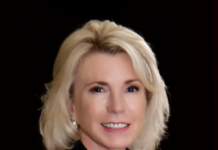Vince Gaydarzhiev Podcast Transcript
Vince Gaydarzhiev joins host Brian Thomas on The Digital Executive Podcast.
Welcome to Coruzant Technologies, Home of The Digital Executive Podcast.
Brian Thomas: Welcome to The Digital Executive. Today’s guest is Vince Gaydarzhiev. Vince Gaydarzhiev is the founder and president of Alcatraz AI, a global provider of frictionless AI powered biometric access control solutions, revolutionizing security through facial authentication with over 10 years of technology engineering experience.
Vince continues to lead Alcatraz AI with pioneering. biometric authentication and security solution advancements driven by his passion for leveraging cutting edge technology to enhance safety and efficiency.
Well, good afternoon, Vince. Welcome to the show!
Vince Gaydarzhiev: Thank you for having me!
Brian Thomas: Absolutely. Love doing this.
Appreciate you making the time you based out of LA right now. I’m in Kansas city. So good timing this evening for our schedules, but Vince, let’s just jump right into your first question here. What inspired you to focus on biometric access control as the primary application for AI at Alcatraz AI, and how has your vision evolved since the company’s inception?
Vince Gaydarzhiev: Oh, yeah. Thank you for hosting. Great question. I’ve been working on this for the last eight years. My experience mainly is coming from Apple. Before Apple, I used to work at NVIDIA on cars, on Tesla cars. But at Apple, I was involved with iPhone creation, iPad creation, and the inception of Face ID, the project that eventually became Face ID and how you do sensing and facial recognition on the phone.
for having me. So, you know, that’s, that’s what we were doing at Apple. And at some point, we visited a bunch of factories, data centers, locations for, with high security. And I just saw an opportunity based on the access control, the security back in the days, back, you know, eight, nine, 10 years ago with, you know, badges and other ways to authenticate like iris or fingerprint readers.
Apple mostly uses just guards, security guards, asking you to badging, kind of doing manual facial recognition between the the badge and the face. And I just got inspired to do the face ID of the physical world for enterprise. So large companies don’t have to go through this. They don’t have to, you know, create huge budgets to afford thousands or hundreds of guards to increase security.
But, but actually they can use technology to solve for, for security. That’s the premise of Alcatraz.
Brian Thomas: I like that. You know, security has got to be paramount these days, as you know, whether it’s in the fintech world or just physical security, as you mentioned, we got to start leveraging the newer technology and ways that we can thwart a lot of these ways that people are bypassing security measures to get in either to a building or get into somebody’s bank account.
So, I appreciate you really focusing on that. Vince, Alcatraz AI has been at the forefront of implementing facial authentication and security systems. How do you ensure the privacy and security of users’ biometric data while maintaining the system’s efficiency?
Vince Gaydarzhiev: Great question. Thank you for asking, Brian.
So, you know, we knew about privacy and security and, you know, information security policies and networking policies and just the very basic need for privacy and, you know, keeping PII safe for the employees of our potential customers back in days. So, we designed our platform and product with this in mind and its core.
Ever since 2016, we’ve been working on technology, including patents on how we can see the world, send the world to see faces, but actually don’t connect those faces to the people’s names, people’s private information. We include our technology. We use a lot of layers. On how we pay the operating system and how we deploy, manage the enrollments of our employees, how we move data through the environment, even on-premise environment and organizations to make sure we keep privacy and security intact.
And now with GDPR and you’re coming into play more and more in the U S. Since now the new additions to the law basically say that any GDPR employee, any European employee of a large corporation, if they come in the U. S., if they go outside Europe or European Union, GDPR will follow them. Law follows them.
So even if they come in the U. S., even if they go to a different region outside the European Union, GDPR will essentially apply there as well. So that kind of triggers a situation where, for example, in the U. S. there is no federal level privacy kind of security law. There’s some state level laws, like BIPA in Illinois.
But now a lot of companies, a lot of global companies, need to have GDPR technologies inside U. S. as well, just so they pass their audits and they’re safe, as they have offices in the European Union. And our technology comes right in there and it was built in its core with privacy and, you know, be a free environment in mind.
Brian Thomas: Thank you. You’re absolutely right. I think GDPR comes to the forefront. As you know, some states are getting a lot stricter around that, especially in California, as you know. So, I appreciate you highlighting that. And Vince, the landscape of AI regulation is rapidly evolving, especially with upcoming frameworks in regions like the European Union.
How is Alcatraz AI preparing to navigate these regulatory challenges and what impact do you foresee this having on the adoption of biometric technologies?
Vince Gaydarzhiev: First, this is great. This has been a long time coming. I’m happy in the last couple of years, open AI and the rest of the newcomers in the AI space, they’re opening up the doors for regulation and how we make sure AI isn’t going to get out of control.
Both on the technology side, but also on the privacy side. So, in the world, it’s privacy a little bit longer and hopefully more and more. And now, now that they’re aware of the risks. And OfficeRest is going to be doing the same thing we’ve been doing since the beginning, since we knew about what the enterprise needs, requirements are around privacy and security, we co built many of the requirements with large corporations since back in 2017, 2018, when we started deploying pilots with our tech, GDPR and a lot of a lot of the large enterprise information security reviews and regulations were not really developed, so we helped them develop, CodePod developed with us.
And we’re happy now that, you know, as, as the wave of AI is coming in, maybe second wave of AI is going to be coming in with more strict rules around data and privacy, not only by metrics, but across many industries, a lot of verticals. We feel very confident. We actually have built. Pretty amazing technology that will comply and it will be on the forefront of the regulation.
We were actually one of our benefits as a company is we have built a pretty awesome over the air updating system, kind of similar to a Tesla, right? You used to buy security technology one time, you deploy it and it’s frozen in time. Now we have continuous updates. Monthly, quarterly to keep being on the forefront of privacy and software and, you know, just in general networking security to the point where we can make a feature proof product that once a global company deploys in the U.S. and outside the U.S. in 10, 20, if I can make like many, many regions. They don’t have to worry about one of those regions changing the laws and our technology now not complying. That’s a big issue for companies where they want to keep an umbrella one technology certified across the globe. So, they don’t have to mix and match, especially in biometrics and access control and, you know, people’s templates and how they’re used.
But that’s exactly what we promised. We, we promise that we’re going to be evolving with regulation to provide value to our customers in a way to future proof our technology in the future.
Brian Thomas: Thank you. I appreciate that. And in a way, Vince, you’re kind of setting a standard, you know, you’re at the forefront of really, you know, Pioneer in this deployment.
And again, you may honestly be setting the industry standard at some point. So, I appreciate you highlighting that as well. And Vince, last question of the day, looking ahead, what are the most promising advancements in AI powered security solutions that you believe will shape the future of the industry?
And how is Alcatraz AI positioning itself to lead in these areas?
Vince Gaydarzhiev: Yeah, great question. So, as we’re coming into the world of GPTs and data, this will be the number one thing we, we as an industry, and even as a company we’ll be working on in the future, how can we use massive amounts of data, not personal data, not employee data, sensor data.
Right. Your environment where you are right now, either at home or in the office, it creates a lot of data based on all the sensors that are deployed. How do you make sure you collect that sensing data? You make sense out of it and you give it back as a tool. So, admins, security teams. executives, management, analysts can actually make sense of it much, much faster.
Think of it as a trained GPT in security for the future. So that’s one thing. And second thing is not only through AI specifically in analytics, But also, how can you start augmenting things that are physical, that are legacy, that can be optimized in a way for them to help them? For example, how can you augment physical guards, right?
Companies or other entities, they deploy physical guards everywhere. But a physical guard gets tired that, you know, you have to have basically three shifts of guards all the time at a certain, you know, area to, and even then, it’s kind of hard to, to guard something. How can you deploy AI and technology with machine learning, computer vision, you know, with data to augment what’s physical and potentially deploy at many more locations currently?
Not secure enough, not, not guarded in a way to overall increase significantly the security posture of an organization to make it safe for the employees, for the organization itself, as now things not technology as it’s developed, it’s becoming much more advanced, much more complex, which means a lot more IP.
A lot stronger IP, IP that costs a lot, a lot more money and time and employers to develop. How can you guard that IP either in, in the, in the data center environment or the corporate environment? How can you make sure everything is safe from an IP, from an employee perspective, or you have to significantly increase physical security, you know, security in the organization, not only cyber security as now cyber and physical kind of merging into one field of security or by AI.
So, I think that’s where the industry is going and, you know, hopefully Alcatraz is also on the forefront of that.
Brian Thomas: Yeah, I would certainly agree with you. There’s still a lot of human involvement, whether it’s physical security, data center, cybersecurity, and having AI augment all those areas are key to the success of securing a lot of this data.
So, I appreciate your thoughts on that. And Vince, it was certainly a pleasure having you on this evening and I look forward to speaking with you real soon.
Vince Gaydarzhiev: Thank you for hosting. Much appreciated.
Brian Thomas: Bye for now.
Vince Gaydarzhiev Podcast Transcript. Listen to the audio on the guest’s podcast page.











